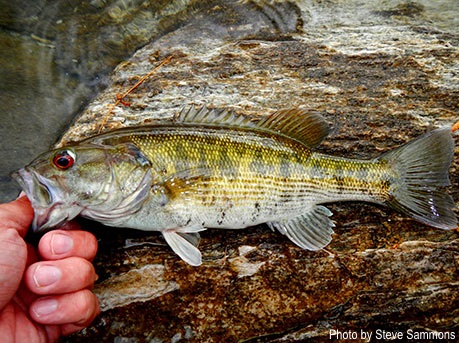Species Restoration
Redeye Bass Conservation
Stream survey efforts and DNA analysis are providing vital information about the status of a fish unique to the Savannah River basin of South Carolina and neighboring Georgia.

The redeye bass is a member of the black bass family, which also includes the more widely known largemouth bass. Redeye bass is native to the cool flowing Piedmont streams and rivers of the Savannah basin where it is often found in and around rocky shoals. Adults in streams are typically up to 9 inches in length and weigh up to about a pound, though they reach larger sizes in lakes. Lake Jocassee, SC produced a world record for the species of 5 pounds 2.5 ounces! Redeye bass serve an important ecological role as a top predator in the waters where they are found. The redeye is also an aggressive fighter and reeling one in is a treat for any angler.
This unique species has declined in South Carolina due to the unauthorized release and spread of non-native Alabama bass. Since 2004 DNR biologists and partners at University of South Carolina have been using DNA analysis to follow changes in redeye bass populations due to hybridization with this invasive species. This work has documented the near total loss of redeye bass in some Savannah lakes where they once thrived, including Lakes Keowee and Russel. Dramatic declines have also been seen in Lakes Jocassee and Hartwell.
Efforts are now focused on streams in the redeye’s native range as Alabama bass and their hybrids have been found in some surveyed stream sites. Work is currently planned to expand stream survey efforts to better define the extent of the Alabama bass invasion, to identify areas that currently support redeye bass, and to identify spawning areas used in streams by both species. What is learned will be used in determining the best conservation strategies for redeye bass.
You can be a partner in native species conservation by never releasing fish into waters other than from where they were caught. Spread the word, and help stop the spread of invasive and non-native species!
Partners in this work through funding and collaboration include U.S. Fish and Wildlife Service grants programs, Duke Energy, University of South Carolina, Georgia DNR, Clemson University, Southern Aquatic Resources Partnership, and National Fish and Wildlife Foundation.
